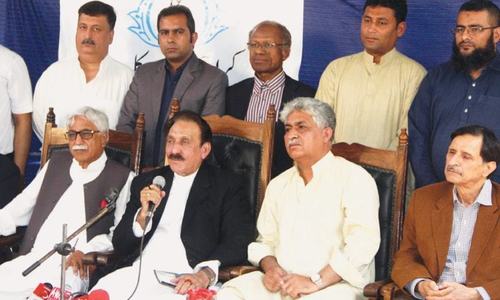IHC says Tyrian White's parentage a 'private matter', throws out disqualification petition against PM

The Islamabad High Court on Monday threw out a petition seeking the disqualification of Prime Minister Imran Khan, terming it non-maintainable as it involved personal matters.
IHC Chief Justice Athar Minallah and Justice Miangul Hassan Aurangzeb heard the petition, submitted by Hafiz Ehtesham, spokesperson of the infamous Lal Masjid's Shuhada Foundation.
The petitioner had sought to argue that Prime Minister Khan should be disqualified for 'concealing' his alleged parentage of Tyrian Jade Khan White in his nomination papers for the 2018 election.
However, the judges refused to dwell on the arguments and admonished the petitioner for not understanding the law or respecting Islamic teachings about respecting others' privacy.
Case history
Ehtesham had submitted the petition prior to the general election in July 2018. The IHC had initially fixed it for hearing along with a similar request submitted by Abdul Wahab Baloch of the Justice and Democratic Party Pakistan (JDP).
In Aug 2018, a two-member division of IHC bench had recused itself from hearing Wahab's appeal after the counsel of a candidate from NA-53 Islamabad challenged the constitution of the bench.
In December 2018, Wahab joined the Pakistan Tehreek-i-Insaf (PTI). He simultaneously decided to withdraw his petition against the premier.
On Jan 15, Ehtesham submitted a miscellaneous request in which he said that his request should be separated from Wahab's, pleading that it be fixed for a hearing separately.
On Jan 16, the IHC approved his request and agreed to hear it shortly. It was eventually fixed for today (Jan 21).
Arguments
Ehtesham argued in court Khan was a public office holder and therefore his personal matters could not be considered beyond scrutiny.
However, Justice Minallah asked the petitioner if he had read Article 63(1)(h) of the Constitution, under which he had sought PM Khan's disqualification. Article 63(1)(h) stipulates that a person convicted of a crime of "moral turpitude" and sentenced to jail for not less than two years can contest elections if five years have lapsed since his release.
"In Islam, it has been said that [one should attempt to] put a curtain on [other people's] private matters," the IHC judge added, admonishing the petitioner for interfering in what the judge believed to be a personal matter for the premier.
He also warned the petitioner that if such requests were submitted in the future, the petitioner would be fined.
The prime minister's counsel, Dr Babar Awan, was present in court on his behalf. However, he did not need to present his arguments as the court discarded the petition while hearing the petitioner.













































